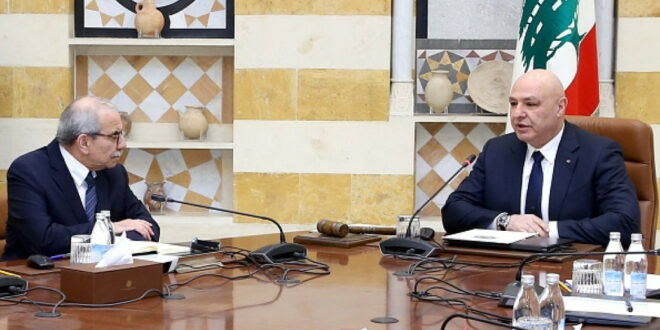Lebanon’s cabinet meets on Friday to review the army’s sensitive plan on weapons, with Hezbollah’s stance and Israeli escalation heightening tensions.
Lebanon’s government is bracing for one of its most sensitive cabinet sessions in years, with ministers set to debate the army’s long-awaited plan to place all weapons under state authority, including Hezbollah’s vast arsenal.
The meeting on Friday comes under heavy pressure from Washington and Riyadh, which have linked support for the army and reconstruction aid to progress on the issue, even as Israeli airstrikes continue to pound the south.
Late on Wednesday, Israeli attacks on several towns killed four people and wounded 17, among them four children.
Army plan shrouded in secrecy
The Lebanese army has kept its plan under wraps, but military sources told The New Arab it would not be “confrontational” and that its priority is to preserve stability and civil peace while addressing national concerns.
According to the sources, the proposal lays out a framework for receiving weapons from Hezbollah in coordination with the group, beginning as it did south of the Litani River and then moving in stages to the north, the Bekaa, Beirut, and beyond.
It also details the logistical, financial, and manpower support the army requires, while stressing the need for Israel to halt its attacks and withdraw from occupied positions so the army can complete its deployment in the south.
The army had aimed to meet the cabinet’s end-of-year deadline, the sources added, though some elements may take longer to finalise.
Since the end of the civil war, Hezbollah has defended its arsenal as a “resistance” force against Israeli occupation of Shebaa Farms, the Kfar Shouba hills, and the Lebanese side of Ghajar.
Over time, it has built the most powerful non-state military force in the region, rivalling the Lebanese Armed Forces themselves.
Efforts to define Hezbollah’s role under a national defence strategy, most notably during the ‘Dialogue Table’ sessions convened after the 2006 war, collapsed amid divisions over the weapons.
Hezbollah has maintained that its arsenal is essential for deterrence, while its critics argue that it undermines Lebanese sovereignty.
Scenarios for Friday’s session
The outcome of Friday’s cabinet session remains uncertain, with several scenarios under discussion across Lebanese media.
Ministers could approve the army’s plan despite opposition from Hezbollah and Amal, as happened in the 5 and 7 August sessions at Prime Minister Nawaf Salam’s urging.
Another option is to present and debate the plan, but postpone any vote to avoid a direct clash with the two groups.
Parties opposed to Hezbollah, particularly the Lebanese Forces led by Samir Geagea, who holds four cabinet seats, are pressing for swift approval.
“There is no turning back, and any retreat would be a failure for the government both domestically and internationally,” they argue.
Hezbollah and Amal insist the issue must be addressed through dialogue under President Joseph Aoun’s oath, the ministerial statement, and a broader national defence strategy.
A Hezbollah parliamentary source told The New Arab that “political contacts are ongoing and will continue until the session begins. All scenarios remain open, and our response will depend on what happens during the meeting. The government faces a major challenge tomorrow and must adhere to its ministerial statement and backtrack on decisions that only serve the Israeli enemy”.
The source added that Hezbollah would not surrender its weapons “or even discuss the matter as long as the [Israeli] occupation and aggression continue”.
“If a decision is passed tomorrow like those of 5 and 7 August, we will not recognise it, just as we rejected previous decisions. We will then take our own steps,” the source warned.
Meanwhile, President Aoun said he had spoken with UNIFIL commander General Diodato Abagnara after Israeli drones bombed near peacekeepers clearing roadblocks in Marwahin.
He condemned the strike as the most serious incident since the November truce, less than a week after the UN Security Council renewed UNIFIL’s mandate.
“These attacks confirm once again that Israel persists in defying the international community, which only days ago called for an end to hostilities against Lebanon, withdrawal from occupied Lebanese territory in the south, the return of Lebanese detainees, and the full implementation of Resolution 1701,” Aoun said.
He stressed that Israel had prior knowledge of UNIFIL’s work, calling the strike deliberate and premeditated, and urged international action to halt repeated violations.
Aoun noted that Israeli strikes on southern towns continue daily, killing civilians and targeting homes and public facilities. Prime Minister Nawaf Salam echoed the condemnation, calling the attacks “a blatant violation of the November ceasefire declaration, Resolution 1701, and the principles and provisions of international law”.
“The credibility of the international community is on the line. It must act immediately to compel Israel to stop these attacks and respect Lebanon’s sovereignty and the safety of its people,” Salam said.
 Eurasia Press & News
Eurasia Press & News


